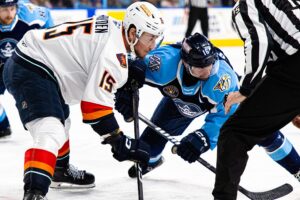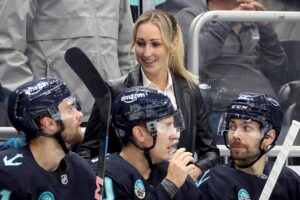![]() Patrick Williams, TheAHL.com Features Writer
Patrick Williams, TheAHL.com Features Writer
It was May 29, 2022. Tampere, Finland. The IIHF World Championship’s gold-medal game featuring two hockey heavyweights, Canada and Finland, before a roaring crowd at Nokia Arena. TSN and the NHL Network beamed the game back to viewers in North America.
“The Finnish fans, they came to play,” said Chris Driedger, in net for Canada that night.
Driedger had forged a lengthy path to earn this opportunity, on this stage. The Winnipeg native was a 2012 third-round draft pick by the Ottawa Senators and spent four seasons in the organization playing for four ECHL teams and two AHL clubs (Binghamton, Belleville) – in addition to three appearances in the NHL with the big club.
“Ottawa taught me a lot, and I made a lot of strides with that organization,” Driedger said, “but it ended up not being meant to be.”
He started the 2018-19 season on an AHL contract with the Springfield Thunderbirds, spending most of the first half of the season back in the ECHL.
“Kind of took the scenic route,” he quipped. “My habits weren’t where they needed to be to get me to the NHL.”
On Dec. 29, 2018, Florida traded Thunderbirds goaltender Michael Hutchinson to Toronto. Driedger was recalled by Springfield to share the crease with Sam Montembeault, and by late February he had landed an NHL deal with the Panthers. When the season ended Driedger inked a two-year extension with the Panthers, and he broke back into the NHL in 2019-20, going 7-2-1 with a 2.05 GAA and a .938 save percentage in 12 appearances. He spent the entire 2020-21 campaign with Florida, even making two starts in the Stanley Cup Playoffs.
Driedger caught the eye of the Seattle Kraken, who selected him in the expansion draft in the summer of 2021, as well as of Hockey Canada, who named him to the national team for the World Championships in 2022.
“It was very special,” Driedger said. “This was the first opportunity for me to wear the maple leaf and represent Canada, so it was a dream come true.”
And on that May evening in Tampere, he had a chance to win a gold medal.
Canada had taken a 1-0 lead into the third period, but now Finland was beginning a 5-on-3 power play. Off a face-off inside the Canadian zone, a booming right-point shot missed the net and caromed off the end boards to Mikael Granlund below the left circle. From a sharp angle, Granlund whipped the loose puck as Driedger scrambled to move his 6-foot-4 frame across the crease. As Driedger did, he moved into a near-complete split as Granlund’s shot just eluded his outstretched right blocker.
Driedger’s right knee took much of the force. As Finland celebrated, Driedger was prone on the ice before limping to the bench.
“That was the moment where I hear the fans going bananas,” Driedger recalled, “and I was like, ‘What is going on with my knee right now?’”
Driedger’s night was finished. He could only watch as Finland built a 3-1 lead, as Canada scored twice with his replacement Matt Tomkins off for an extra attacker to force overtime, and finally as the Finns won the gold on another power-play goal in OT.
A week later came surgery. The Kraken put out an announcement: It was going to be a long, long recovery. Seven to nine months.
But goaltending coach Steve Briere, who had joined the Seattle organization shortly after Driedger’s injury, quickly doled out some advice.
“‘You don’t really get a chance to have time off [from] hockey,’” Driedger recalled Briere saying. “‘It’s a nine-month recovery. Maybe take the first two months and do some other stuff.’”
So Driedger did.
“It was an opportunity to take a step away and just refocus,” Driedger said. “That was nice. It was just a good time to do some reading, focus on some other things, get outside, and just take a deep breath. By the time I was ready to start skating again, I missed it quite a bit.
“It was a good exercise… I don’t think a lot of players get to do [it] because our season is so long. I took some time, watched a lot of video, and was lucky to have a lot of time with Steve in Seattle just working on some little tweaks and getting myself back to where I needed to be. It was a good opportunity to approach things differently and get some mental clarity and just hone my game.”
Driedger finally returned to game action on Feb. 27, 2023. It was a long way from Finland; it was a regular-season game with the expansion Coachella Valley Firebirds, Seattle’s new AHL affiliate in the southern California desert. He stopped 30 shots in a 4-3 overtime win over the San Jose Barracuda.
Driedger would show well (9-4-0, 2.61, .908) over his 14 appearances in the regular season before backing up Joey Daccord through the Firebirds’ storybook run to the Calder Cup Finals. And with Daccord emerging as the Kraken’s number-one goaltender this season, Driedger returned to Coachella Valley and led them to the Pacific Division title – and now another trip to the Western Conference Finals.
As the Firebirds struggled early in the 2023-24 season, Driedger held them in games until the rest of the roster could find its form. And the big payoff for all of that rehabilitation work, stress and uncertainty came on Dec. 27, 2023, when the Kraken visited Calgary – where Driedger played three seasons of junior hockey and still spends his offseasons. That morning he got word that the Seattle net was his that night.
Driedger’s billets from his WHL days were at Scotiabank Saddledome that night to see his first NHL appearance since May 1, 2022. He made 37 saves to lead the Kraken past the Flames to a 2-1 victory.
“It was very special,” Driedger said. “I know that building. I’ve played a lot of games in that building. That was a really special day. It was good for my confidence, too, to get back. To go in, play well, and help the team win was a good feeling.”
The following week he dressed as the Kraken hosted the NHL Winter Classic. He got another start on Jan. 16, at Madison Square Garden against the New York Rangers. But Driedger’s season largely has been spent with the Firebirds where he showed that he could handle a steady post-injury workload, playing 39 games and going 24-7-7 with four shutouts, finishing fourth in the AHL with a 2.26 GAA and sixth with a .917 save percentage.
Coachella Valley is a club with serious Calder Cup plans. After coming within a bounce of the puck of the championship last year, they matched their 103-point output in the regular season and have gone 6-1 in eliminating Calgary and Ontario in their first two playoff rounds. Driedger has a 2.39 GAA and a .921 save percentage in the postseason, including a series-clinching shutout of the Wranglers on May 10.
Where all of this could go remains to be seen. But the Firebirds are four wins away from a second straight conference championship, and eight wins shy of the Calder Cup that eluded them a year ago. And it has already meant lots more desert sun and time together for a close-knit group of teammates. For Driedger, who has been through some of the worst that hockey can throw at a player, he is not overlooking the importance of these times.
Driedger turned 30 on Saturday. This is his 10th pro season. He is not taking any of it granted.
“I tell the guys often, ‘Boys, when you look back at the good ol’ days, we’re in them right now.’”
On the American Hockey League beat for two decades, TheAHL.com features writer Patrick Williams also currently covers the league for NHL.com and FloSports and is a regular contributor on SiriusXM NHL Network Radio. He was the recipient of the AHL’s James H. Ellery Memorial Award for his outstanding coverage of the league in 2016.







































